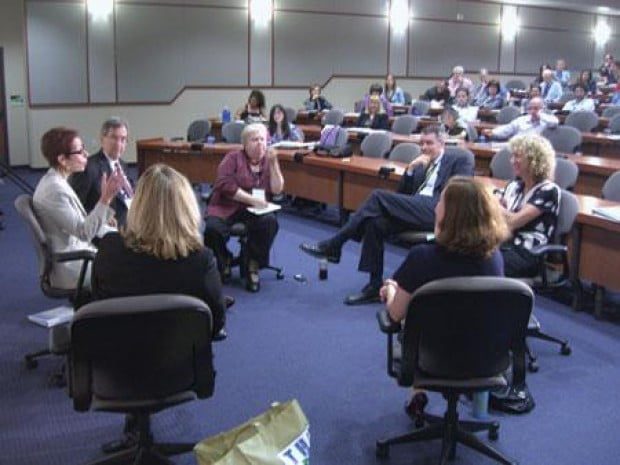
Approximately 170 people attended Pepperdine University’s green conference titled, “Taking it Upstream: Collaboration, Consensus Building and Sustainable Development-A Green Leadership (Un)Conference,” last week Friday at the university’s Malibu campus.
Attendees also included mayors and representatives of five local cities, including Malibu City Councilmember Pamela Conley Ulich, West Hollywood Mayor Abbe Land, Pasadena Mayor Bill Bogaard, Santa Monica Mayor Pro Tem Pam O’Connor and Krista Kline, a representative from the office of Los Angeles Mayor Antonio Villaraigosa.
Facilitated by experts on land-use, environmental dispute, community leadership, urban development and legislative law, the conference’s goal was to answer big questions facing an industrial, 21st century society: how to deal efficiently, fairly and immediately with the looming environmental disasters of climate change challenging the planet.
According to the organizers, the best way to do that was to practice inclusive and informed debate with all parties.
Conceived by Steve Zikman, a graduate of Pepperdine’s School of Law with a master’s in dispute resolution and specializing in environmental issues, the conference was co-hosted by the Straus Institute for Dispute Resolution, Pepperdine School of Law and the Palmer Center for Entrepreneurship and the Law.
Policy wonks of city, state and private enterprise focused on the question of how to manage exploding urban density while implementing legislation for a sustainable future.
“Most people now accept that climate change is real,” Zikman said in a phone interview with The Malibu Times. “The challenge is in finding ways to collaborate between governmental, public and private sectors to fight it.”
To that end, Zikman organized what he termed an (un)conference as an indication of thinking outside of the box. The idea, Zikman said, was to galvanize respectful and effective dialogue to address immediate crises.
“A lot of green stuff, like household recycling or drought-resistant planting, is easy, but the big picture is much bigger and daunting,” Zikman said. “So how can we get more consensus building? How can we take action from dialogue to realization?”
Conversations included “The Big Picture,” “The Local Perspective,” “The Public/Private Nexus” and “State v. Local Authority,” indicating the complexity of effecting any meaningful social change.
Two big issues discussed were implementation of signature legislative environmental bills: AB 32, which would require the California Air Resources Board to design regulation that will reduce California’s greenhouse gas emissions 25 percent by 2020, and SB 375, which mandates regional reduction of greenhouse gases through appropriate land-use planning.
Both bills have approaching deadlines and require intricate collaboration between public and private interests at a time when state and regional governments are hard-pressed for cash to institute new and potentially expensive environmental programs. Zikman said the cost of doing nothing would eventually be much higher.
“Right now, no one knows what’s happening,” Zikman said. “So if we approach the problem upstream, rather than waiting until we are metaphorically in the rapids, we have more time to come up with the most efficient solutions.”
The 170 attendees to the conference had as many questions as ideas. From a roundtable discussion on “Cutting Edge Collaborative Techniques:” Why not engage the 5 percent of people who are against any change and see if you can address their issues, rather than the 95 percent who agree on immediate action? From a discussion on “The Big Picture:” Why are we still building landfills? From a discussion on “Taking It Upstream:” When do governments bring population control into a broader conversation?
From changing zoning laws to require higher density, thereby reducing an individual’s carbon footprint, to eliminating governmental subsidies that encourage urban sprawl, to establishing incentives for good land-use planning (L.A. County has four times the retail zoning it needs, according to a 1996 report by the City Planning office, for example), panelists gathered ideas from attendees in panel discussions.
“These are all great,” panelist Woodie Tescher, an expert in urban planning and design, said in a discussion called “Cap and Trade-offs.” “But they all require great civic leadership.”
The city representatives discussed implementation of AB 32 and SB 375.
“Since we’re a young city [Malibu incorporated in 1991, compared to the other, much older, incorporated cities present], we are not looking to completely revise our planning regulations,” Conley Ulich said. “Sustainability and the environment are already top priorities in our codes. I think our next step is to focus on classrooms and the next generation.”
All city representatives agreed that the biggest issue was future urban density with growing populations. Land pointed out that city councils today are forced to consider what their communities will look like in 20 years.
“It’s uncharted territory,” Land said.
“How do you accommodate a community with a broad range of finances?” O’Connor asked. “We’ll have to make some hard decisions.”
Though the city planners agreed that tomorrow’s problems could provide opportunities today, unpopular decisions like regulating transport options through setting maximum parking spaces and mandating green building codes to developers affect constituents’ electoral choices.
Conley Ulich acknowledged that unpopular decisions affect people’s votes.
“Sometimes you have to say, ‘But this is the right thing to do, even if it means you don’t vote for me,’” she said.
